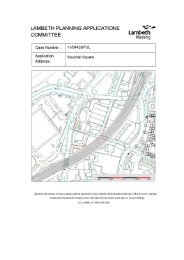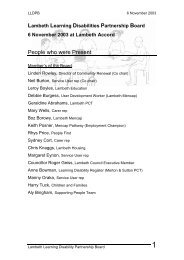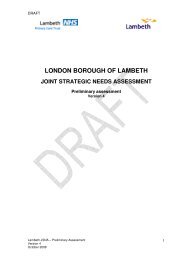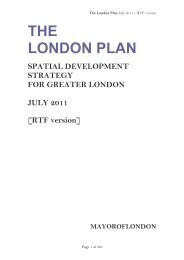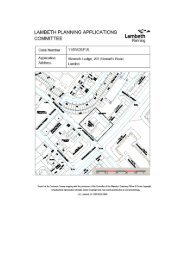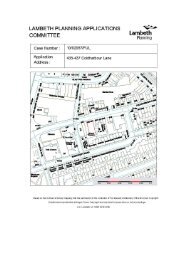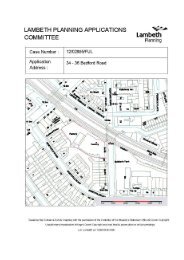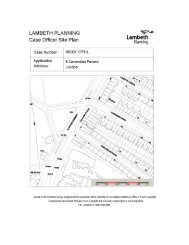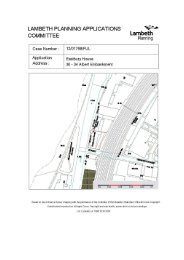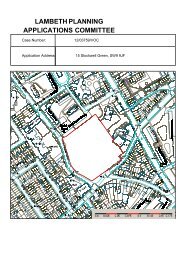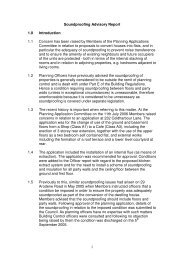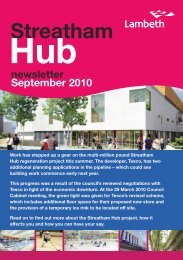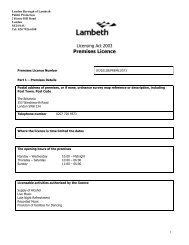04a NLE Update PDF 366 KB - Lambeth Council
04a NLE Update PDF 366 KB - Lambeth Council
04a NLE Update PDF 366 KB - Lambeth Council
You also want an ePaper? Increase the reach of your titles
YUMPU automatically turns print PDFs into web optimized ePapers that Google loves.
Overview and Scrutiny Committee 29 January 2013<br />
NORTHERN LINE EXTENSION – TECHNICAL UPDATE<br />
Stockwell, Oval and Princes Wards<br />
Report authorised by: Executive Director, Housing, Regeneration & Environment:<br />
Sue Foster<br />
Executive summary<br />
In March 2012 Cabinet gave approval in principle to the Northern Line Extension (<strong>NLE</strong>)<br />
proposals including the route alignment, the location of a new station on Wandsworth<br />
Road, the location of permanent shafts and the location of a temporary shaft required<br />
during the construction period subject to;<br />
(1) all the concerns raised by residents at this meeting being<br />
considered.<br />
(2) Cabinet responding to the clear appetite for further active<br />
engagement and consultation with residents.<br />
At the meeting the Executive Director of HRE undertook to report back to Cabinet on<br />
technical issues related to the <strong>NLE</strong> and specifically on those concerns raised over<br />
noise. In response to concerns raised the scheme design and the potential impacts on<br />
<strong>Lambeth</strong> residents a technical consultant, Ramboll, was engaged to undertake a<br />
technical assessment of the <strong>NLE</strong> design and to advise the <strong>Council</strong> on any matters<br />
arising.<br />
This report provides an update on how the <strong>NLE</strong> design work being undertaken by<br />
Transport for London (TfL) has progressed since April and the outcomes of the<br />
technical assessment undertaken by Ramboll.<br />
Summary of financial implications<br />
This is status report and there are no specific financial implications arising from the<br />
recommendations.<br />
This report does not commit the council to funding the <strong>NLE</strong>.<br />
Recommendations<br />
(1) To note the content of this report.
Consultation<br />
Name of<br />
consultee<br />
Department or Organisation Date sent Date<br />
response<br />
received<br />
Comments<br />
appear in report<br />
para:<br />
Internal<br />
Sue Foster Executive Director HRE 16/01/13 17/01/13<br />
Michael O’Hora Governance and Democracy 11/01/13 11/01/13 4.1<br />
Hamant Bharadia Department Finance Officer 06/12/12 15/01/13 3.1 & 3.2<br />
Sandra Roebuck Regeneration 08/01/13<br />
Carolyn Dwyer Divisional Director Public Realm 02/01/13<br />
Frank Higgins Corporate Finance 15/01/13 16/01/13<br />
Elena Nicolau Governance and Democracy 17/01/13 17/01/13<br />
<strong>Council</strong>lor Peck Leader of the <strong>Council</strong> 13/01/13 18/01/13<br />
<strong>Council</strong>lor Robbins Cabinet Member for Housing & 13/01/13<br />
Regeneration<br />
<strong>Council</strong>lor Walker Cabinet Member for<br />
Environment and Sustainability<br />
13/01/13<br />
Report history<br />
Date report drafted: Report deadline: Date report sent: Report no.:<br />
XX.XX.12 XX.XX.12 XX.XX.12 217/10-11<br />
Report author and contact for queries:<br />
William Howe, Senior Transport Planner<br />
020 7926 0190 whowe@lambeth.gov.uk<br />
Background documents<br />
• Northern Line Extension Report Cabinet (16.01.12 - report 245/11-12)<br />
• Overview and Scrutiny Committee Minutes (09.02.12)<br />
• Northern Line Extension to Battersea: Independent Technical Review - Ramboll<br />
Appendices<br />
Appendix 1 – Kennington Park Shaft technical note<br />
Appendix 2 – Minutes from Resident and Stakeholder Technical Engagement meeting,<br />
September 16 th 2012<br />
Appendix 3 – Minutes from Resident and Stakeholder Technical Engagement meeting,<br />
December 4 th 2012
Northern Line Extension – Technical <strong>Update</strong><br />
1. Context<br />
1.1 In March 2012 Cabinet gave in principle approval for the <strong>NLE</strong> project including<br />
the route alignment, location of a new station on Wandsworth Road and the<br />
location of permanent and temporary shafts. At that time stakeholders raised<br />
concerns that the <strong>Council</strong> had not provided the appropriate amount of scrutiny to<br />
the proposals and that there had been a lack of consultation and communication<br />
with residents both from TfL and the <strong>Council</strong>.<br />
1.2 In response to this Ramboll who are a multi-disciplinary engineering consultancy<br />
with experience of major tunnelling projects were engaged to act as technical<br />
consultants in respect of the <strong>NLE</strong> and tasked with undertaking a full review of the<br />
scheme proposals and to advise the <strong>Council</strong> on the potential impacts of the<br />
scheme both during the construction and operation of the <strong>NLE</strong>.<br />
2. Proposals and reasons<br />
2.1 The case for the <strong>NLE</strong><br />
The need for the <strong>NLE</strong> is development led, with significant additional transport<br />
capacity being required to accommodate the additional trips that will be<br />
generated by all developments in the Vauxhall Nine Elms Battersea (VNEB)<br />
Opportunity Area (OA) . The <strong>NLE</strong> has been identified by TfL as the only viable<br />
option that will provide enough public transport capacity in the long term to<br />
accommodate the scale of development proposed for the VNEB OA. The<br />
Planning Framework concludes that in order to enable and support this<br />
development a package of strategic transport measures, supported by a series of<br />
more local transport improvements will be required to support growth and<br />
development of the OA. These include:<br />
• An optimum package of bus service enhancements including the introduction<br />
or extension of bus routes;<br />
• An extension to the Northern -Line, from Kennington to Battersea Power<br />
Station, with an intermediate stop in the Nine Elms area;<br />
• Improvements to the National Rail, Underground stations and interchange<br />
facilities at Vauxhall and Battersea Park stations;<br />
• A step change in the walking and cycle environment both within and to/from<br />
the OA and ensuring improved legibility and connections;<br />
• An approach to development which reduces the need to travel by<br />
car/reduces the number of private vehicle trips within the OA;<br />
• Improving conditions for taxis, coaches, freight and river services within and<br />
to/from the OA; and
• Private investment to enable these improvements to be secured and<br />
delivered in line with the future development of the area.<br />
The <strong>Council</strong> has always stated that a wider transport strategy, with a<br />
significant emphasis on bus improvements, is required and that this would<br />
link the new developments to existing residents and businesses in <strong>Lambeth</strong>.<br />
Such improvements formed a key part of the <strong>Council</strong>’s initial support for the<br />
<strong>NLE</strong>.<br />
2.2 <strong>NLE</strong> Reference Design Review<br />
Ramboll have undertaken a full assessment of the <strong>NLE</strong> Reference Design<br />
produced by Halcrow, who are TfL’s consultants for the <strong>NLE</strong>, in order to confirm<br />
that all relevant work has been undertaken and that design methodologies are in<br />
line with industry best practice.<br />
The detailed outcomes of this are contained within Ramboll’s report which is<br />
included as a background paper to this report but the headline issues are set out<br />
below.<br />
2.3 Working with residents and other stakeholders.<br />
In response to Cabinet recommendations and concerns from residents about the<br />
impact of the <strong>NLE</strong> officers in conjunction with Ramboll have worked with<br />
residents and stakeholders to ensure that their views and concerns are<br />
appropriately considered and addressed. There has also been regular dialogue<br />
with TfL officers and their consultants to ensure that any impacts on <strong>Lambeth</strong> are<br />
minimised with appropriate mitigation measures put in place.<br />
A public meeting chaired by Valerie Shawcross AM was held on Tuesday 16 th<br />
September 2012 which was attended by 80 members of the public who were<br />
given the opportunity to give their opinions and to raise any concerns. All issues<br />
were compiled and circulated in the form of a meeting note, contained in<br />
Appendix B, with an undertaking from the <strong>Council</strong> given to investigate all issues<br />
and to report back at a later date once answers were known. A follow-up meeting<br />
was held on Tuesday 4 th December 2012 where an update on these issues was<br />
given and a further opportunity for stakeholders to discuss outstanding issues<br />
was provided. Both meetings were attended by <strong>Council</strong>lor Lib Peck.Ramboll’s<br />
findings were published in a report on 24 December which was circulated to<br />
residents and stakeholders that had taken part and is available on our website.<br />
Ramboll were commissioned so that the <strong>Council</strong> can ensure that it makes the<br />
best possible representations and the impact of the Northern Line Extension is<br />
mitigated as much as possible for <strong>Lambeth</strong> residents.<br />
On 30 th December 2012 TfL completed their second round of consultation on the<br />
updated proposals with 40,000 leaflets distributed to affected properties along<br />
the proposed route and holding a series of public exhibitions held offering<br />
stakeholders the chance to raise any concerns and put their views forward.<br />
2.4 Noise and Vibration
Significant concerns were expressed by a number of stakeholders that the<br />
potential noise and vibration impacts of the <strong>NLE</strong> had not been fully assessed by<br />
either TfL or the <strong>Council</strong> and that significant further work should be undertaken<br />
on this issue before any decision on the TWAO was made. These concerns<br />
related to both the impacts during the construction period as well as once the<br />
<strong>NLE</strong> is operational.<br />
Ramboll were instructed to focus significant attention on this area and have<br />
undertaken a thorough assessment of this element of the scheme. The detailed<br />
outcomes of this are contained within Ramboll’s report contained in appendix 2<br />
but the headline findings are;<br />
• The work completed to date is in accordance with current best practice and<br />
working methods and has been progressed to an appropriate stage;<br />
• There is still significant work outstanding that should be completed as part of<br />
the Environmental Statement for the TWAO application;<br />
• There are a range of mitigation measures available to the scheme designers<br />
to reduce nose levels but until further assessment of groundbourne noise is<br />
undertaken as part of the further detailed assessment currently being<br />
undertaken it is not possible to identify which would be required/most<br />
appropriate;<br />
• TfL’s adopted design standard of 35dB L Amax,F is an improvement over<br />
previous standards and in Ramboll’s experience this is acceptable to most<br />
people but a lower level of 30dB is preferable.<br />
2.5 Design Progression and Alterations<br />
Since in principle approval was given in March 2012 the scheme design has<br />
evolved with the most significant change being that TfL have now confirmed that<br />
the proposed permanent shaft in the vicinity of Claylands Green / Cottingham<br />
Road is longer no required and has therefore been removed from the proposals.<br />
This represents a significant victory for the local residents and notably The<br />
Claylands Green Action Group who have been campaigning against this element<br />
of the scheme since the proposals were first set out.<br />
However, it should be noted that this change has required that the diameter of<br />
the tunnel along this section of the route to be increased to allow for a trackside<br />
walkway to be introduced and also that some of the plant proposed for this shaft<br />
will now be located in the proposed Kennington Park Lodge shaft instead.<br />
Officers have requested that TfL thoroughly investigate the knock-on impacts of<br />
these changes to ensure that problems are not merely transferred from one area<br />
to another; particular concern on this has been raised by the Kennington Park<br />
Neighbourhood Action Group (KPNAG) who are concerned that the removal of<br />
the Claylands Green shaft will mean larger, noisier fans being required in the<br />
Kennington Park shaft. KPNAG object to the use of the Kennington Park Lodge
as a vent site in principle and have proposed an alternative site in the existing<br />
Kennington Park service yard which they consider would have less of an impact<br />
on residents living in close proximity to the lodge site. These proposals have<br />
been submitted to TfL for consideration but it is officers’ understanding that TfL<br />
do not support them primarily due to the increased distance of the shaft form<br />
Kennington Station and logistical problems over access during construction. A<br />
separate note on this issue is provided in appendix 1.<br />
Another significant change in the design since March 2012 has been the removal<br />
of the proposed cross-over to the immediate east of the new Nine Elms station<br />
which as been determined by TfL as being surplus to requirements. The removal<br />
of this will reduce disruption during construction and by removing the need for<br />
multiple sets of points to enable trains to cross between the tracks will reduce<br />
noise and vibration levels.<br />
2.6 Impact on existing Northern Line and Kennington Station<br />
Concerns have been raised related to the potential impacts of the <strong>NLE</strong> on the<br />
existing Northern Line, which already experiences significant congestion and<br />
overcrowding at peak times, with some stakeholders unclear as to what level of<br />
assessment has been undertaken to ensure that the additional numbers of<br />
passengers entering the network at Battersea Power Station (BPS) or the<br />
intermediate station at Nine Elms can be accommodated. The question of<br />
whether the constrained internal layout of Kennington Station will be suitable to<br />
cater for the potential numbers of passengers wanting to interchange between<br />
the Charing Cross and Bank branches of the Northern Line has also been raised.<br />
To assess these concerns TfL have already undertaken the first stage of<br />
modelling the expected usage patterns of the <strong>NLE</strong> and its connections to the<br />
existing network and whilst it is too early to draw any firm conclusions from this<br />
TfL are at this stage satisfied that the integration of the <strong>NLE</strong> in to the wider<br />
network would not have any significant impact. <strong>Council</strong> officers have requested<br />
that further assessment of the potential impacts on Kennington Station are<br />
undertaken prior to submission of the TWAO to ensure that there would not be<br />
no adverse impact on its safe operation.<br />
2.7 Implications<br />
The extension is part of a major package of works which will complete the<br />
obligations of the Vauxhall, Nine Elms & Battersea Opportunity Area Planning<br />
Framework. This is a developer led project which will allow the development of<br />
the Battersea Power Station site, as well as developments in the Vauxhall and<br />
Nine Elms areas.<br />
The station at Nine Elms is critical to provide benefit to <strong>Lambeth</strong>, and would<br />
assist in the regeneration of a part of <strong>Lambeth</strong> in need, as well as potentially<br />
easing pressure on the transport network in the Vauxhall area. The station would<br />
also allow greater benefit to accrue from the redevelopment sites of Banham’s<br />
and Sainsbury’s in the Nine Elms area.
The extension from the Kennington Loop to Battersea would preclude any<br />
alternative extension of the Northern Line to areas such as Brixton and/or<br />
Streatham, although TfL have stated their opposition to any extension to<br />
Streatham on the basis of cost, no plausible external funding being available, and<br />
the ensuing overcrowding on the current Northern Line.<br />
3. Finance Comments<br />
3.1 This is a status report and there are no specific financial implications arising from<br />
the recommendations.<br />
3.2 This report does not commit the council to funding the <strong>NLE</strong>.<br />
4. Comments from Director of Governance and Democracy<br />
4.1 There are no legal matters arising from the contents of this report.<br />
5. Results of consultation<br />
5.1 In response to Cabinet recommendations officers in conjunction with Ramboll<br />
have sought to engage with stakeholders to ensure that their views and concerns<br />
are appropriately considered and addressed. There has also been regular<br />
dialogue with TfL officers and their consultants to ensure that any impacts on<br />
<strong>Lambeth</strong> are minimised with appropriate mitigation measures put in place.<br />
5.2 A public meeting chaired by Valerie Shawcross AM was held on Tuesday 16 th<br />
September 2012 which was attended by 80 members of the public who were<br />
given the opportunity to give their opinions and to raise any concerns. All issues<br />
were compiled and circulated in the form of a meeting note, contained in<br />
appendix 2, with an undertaking from the <strong>Council</strong> given to investigate all issues<br />
and to report back at a later date once answers were known. A follow-up meeting<br />
is planned for Tuesday 4 th December 2012 where an update on these issues will<br />
be given and to provide an opportunity for stakeholders to discuss outstanding<br />
issues, the note from this meeting is contained in appendix 3.<br />
5.3 A second round of consultation by TfL on the updated proposals closed on the<br />
30 th December 2012 with 40,000 leaflets distributed to affected properties along<br />
the proposed route and with a series of public exhibitions held that offered<br />
stakeholders the chance to raise any concerns and put their views forward.<br />
6. Organisational implications<br />
6.1 Risk management:<br />
Potential risks include the developers not being able to bridge the funding gap<br />
and asking for contributions. This is especially relevant if work has already<br />
started when funding runs out, which could leave construction having started<br />
including the loss of public open space, and the loss of development across the<br />
Opportunity Area.<br />
6.2 Equalities impact assessment:
Both new stations on the extension will be fully accessible stations, and the<br />
station at Nine Elms will massively improve Public Transport accessibility to a<br />
relatively deprived area.<br />
6.3 Community safety implications:<br />
None.<br />
6.4 Environmental implications:<br />
The extension would be expected to improve air quality through the reduction in<br />
car journeys. There would be temporary negative effects during construction<br />
relating to increased lorry journeys and noise effects from the tunnel boring, but<br />
these are expected to be minimal and only for a short duration. There will be a<br />
temporary loss of public open space during construction, but public open space<br />
is expected to be replaced and enhanced after the construction period.<br />
6.5 Staffing and accommodation implications:<br />
None<br />
6.6 Any other implications:<br />
None<br />
7. Timetable for implementation<br />
7.1 TfL is aiming for a Transport and Works Act Order submission in April 2013. The<br />
extension has a target opening of 2018<br />
__________________________
Appendix 1<br />
Kennington Park Shaft - Technical Note<br />
1. Context<br />
1.1 In March 2012 the <strong>Council</strong> gave in principle approval of the proposed Northern<br />
Line Extension (<strong>NLE</strong>); this included the route alignment, new station site and the<br />
location of permanent and temporary shafts.<br />
1.2 The above plan shows the northern end of Kennington Park with the black circle<br />
indicating the general location of the above ground structure of the proposed<br />
shaft. Currently this site is occupied by the park keeper’s lodge building and<br />
some temporary structures which house a community bee keeping project.<br />
Whilst Cabinet approval was granted for the use of this site for a shaft it is<br />
contingent on TfL submitting a high quality design to mitigate its visual and<br />
environmental impact.<br />
1.3 Given its location adjacent to a listed park it is imperative that the appearance of<br />
the shaft structure is of a high quality reflecting its surroundings and to this end<br />
TfL have been in discussion with the <strong>Council</strong>’s Design & Conservation team. The<br />
design is still being developed and TfL have confirmed that they will shortly be<br />
holding a meeting with local stakeholders to get their views.
1.4 In addition to the visual impact of the shaft TfL will have to demonstrate as part of<br />
the Transport and Works Act Order (TWAO) submission that all potential<br />
environmental impacts from the shaft such as noise and air quality have been<br />
appropriately mitigated. The <strong>Council</strong>’s technical consultants Ramboll will make an<br />
assessment of these proposals and advise on their acceptability.<br />
2. Kennington Park Neighbourhood Action Group (KPNAG)<br />
2.1 Both the <strong>Council</strong> and TfL have had representations made to them specifically in<br />
relation to the Kennington Park shaft from KPNAG who are opposed to the shaft<br />
location as they consider that it will have a negative impact on their members<br />
both visually and environmentally. KPNAG have developed proposals for an<br />
alternative shaft location within the service yard of Kennington Park and these<br />
have been submitted to TfL for consideration.<br />
2.2 TfL has responded that they do not consider that this alternative site is<br />
acceptable due to both its distance from Kennington Station and concerns over<br />
vehicular access. This view has been conveyed to KPNAG but they do not<br />
accept this and have requested that TfL re-examine all available options with a<br />
view to removing the shaft from the lodge site. Ramboll have also assessed the<br />
KPNAG alternative shaft site and have reported that other than the issues raised<br />
by TfL they consider that there are no in principle reasons to exclude the service<br />
yard site from further consideration.<br />
2.3 As can be seen on the above plan the boundary between <strong>Lambeth</strong> and<br />
Southwark runs immediately around the north-eastern boundary of Kennington<br />
Park meaning that the properties in closest proximity to the proposed shaft are<br />
within Southwark. The full membership of KPNAG is not known to officers but it is<br />
understood that the majority of their membership are Southwark residents from<br />
Kennington Park Place and St Agnes Place.<br />
2.4 At a recent public meeting on 4 th December where the <strong>NLE</strong> was debated<br />
members of KPNAG requested Valerie Shawcross AM to assist them in<br />
discussions with Southwark <strong>Council</strong> with whom they felt frustration over their<br />
perceived lack of action on the <strong>NLE</strong> proposals so far. Valerie Shawcross AM<br />
agreed to facilitate a meeting between KPNAG and relevant Southwark<br />
representatives including councillors.<br />
3. Friends of Kennington Park<br />
3.1 The Friends of Kennington Park have been consulted by TfL and the council over<br />
the use of the park keeper’s lodge site and have confirmed their full support of<br />
these proposals. KPNAG have liaised with them directly over their proposals for<br />
the alternative site within the park’s service yard but the Friends have stated to<br />
both KPNAG and the council that they do not support this option and have urged<br />
the council to continue in supporting the park keeper’s lodge site.<br />
4. Summary<br />
4.1 Officers are continuing to work with TfL to negotiate a solution that will mitigate<br />
design and environmental concerns, and which will also improve this neglected
corner of the park. TfL are keen to agree outline designs for the shaft and a list of<br />
conditions relating to planning issues with the council in advance of making the<br />
TWAO submission. Officers will ensure that all relevant issues are covered.
Appendix 2 – Covering Letter & Minutes from 16 th September 2012 public meeting<br />
28 th September 2012<br />
Dear resident,<br />
Thank you for attending the recent meeting on the Northern Line Extension chaired by Val Shawcross<br />
Assembly Member for <strong>Lambeth</strong> and Southwark. We know that residents have concerns about the effect<br />
of the Northern Line Extension. We have listened to those concerns and that is why we have<br />
commissioned engineering consultants Ramboll to carry out a review of Transport for London’s design<br />
work on the Northern Line Extension. As explained at the meeting, this work will be carried out during<br />
the autumn and we will feedback to you throughout this process. It was very helpful to hear all your<br />
concerns and views. Please find enclosed our notes from this meeting, these are intended to capture the<br />
issues raised and we will now be working through these.<br />
Noise, vibration, shaft locations and construction methodology were clearly the main concerns. Transport<br />
for London are planning to hold drop in events in November to help inform residents about the temporary<br />
shaft proposed at Radcot Street and Harmsworth Street. We will ensure that dates are circulated to you as<br />
soon as we have them.<br />
One of the issues of immediate concern is the option to locate a shaft at Claylands Green, we understand<br />
that Transport for London are due to make announcement in the coming weeks and we have written to<br />
them to make clear that using this location is unacceptable.<br />
We have commissioned Ramboll so we can ensure that we make the best possible representations and that<br />
the impact of the Northern Line Extension is mitigated as much as possible for <strong>Lambeth</strong> residents. With<br />
the majority of the extension lying in <strong>Lambeth</strong>, we want to minimise disruption for our communities. If<br />
you have any queries relating to this work then please contact my colleague William Howe, Senior<br />
Transport Planner, <strong>Lambeth</strong> <strong>Council</strong> on 020 7926 0190 or email WHowe@lambeth.gov.uk .<br />
Best wishes,<br />
Cllr Lib Peck<br />
Cabinet Member for Regeneration and Strategic Housing<br />
lpeck@lambeth.gov.uk
Northern line Extension<br />
Resident and Stakeholder Technical Engagement Meeting<br />
Chaired by Val Shawcross CBE London Assembly Member for <strong>Lambeth</strong> and Southwark<br />
Monday 10 September 2012<br />
18:00 – 21:00 Ashmole Tenants’ Hall, Meadow Road, SW8 1AA<br />
Attendees<br />
Val Shawcross AM (Chair) – London Assembly Member for <strong>Lambeth</strong> & Southwark<br />
Cllr Lib Peck – Cabinet Member for Regeneration and Strategic Housing<br />
<strong>Lambeth</strong> <strong>Council</strong> officers –<br />
Abu Barkatoolah - Head of Transportation<br />
Rob Heslop – Transport Planning Manager<br />
William Howe – Senior Transport Planner<br />
Ramboll –<br />
Matthew Garner - Associate<br />
Ray Browne - Associate<br />
Max Elliott – Senior Engineer<br />
Residents and community groups<br />
Purpose of the meeting<br />
Transport for London has continued to develop the Northern Line Extension scheme design. <strong>Lambeth</strong> <strong>Council</strong><br />
know that residents have concerns about the affect of the Northern Line Extension. We have listened to those<br />
concerns and that is why we have commissioned engineering consultants Ramboll to carry out a review of<br />
Transport for London’s design work. This is to ensure that <strong>Lambeth</strong> secures the best possible outcome with<br />
minimum disruption on its residents and businesses. The aim of this meeting was to offer a forum for all<br />
stakeholders who may be affected by the <strong>NLE</strong> to raise their concerns and queries on the design and<br />
construction work so that this can form part of Ramboll’s work.<br />
Issues were addressed by location:<br />
1. Radcot Street/Ravensdon Street temporary Shafts<br />
2. Kennington Park / Kennington Green / Claylands Road shafts<br />
3. Nine Elms Station<br />
4. General queries – apply across the Northern Line Extension area<br />
Issues raised, discussion points and actions from the meeting are listed under each of these headings.<br />
1. Radcot Street / Ravensdon Street Temporary Shaft<br />
Issues raised by residents/community<br />
• Location of shaft<br />
• Parking<br />
• Traffic
• Properties adjacent to shaft and the affect on them.<br />
• Noise and vibration currently, during construction and in the long term once the Northern Line Extension<br />
is complete.<br />
• Truck movements during construction<br />
• Trucks movements and safety for cyclists<br />
• Trains into and out of Kennington , will there be more overcrowding, congestion what is the capacity on<br />
the Northern Line<br />
• Air quality<br />
• Need to make sure that residents are kept informed/communicated with.<br />
Discussion<br />
• Location of shaft may not be fixed until the planning process – Ramboll advised that this will need a<br />
review of further information such as location of electricity cables, gas and water pipes and other buried<br />
services.<br />
• Concern that the timeframe has not been clearly communicated to residents<br />
• Construction Management – need to ensure that this is written into the planning conditions.<br />
• Radcot Street will be closed during construction, this will mean loss of parking, will additional spaces be<br />
provided?<br />
• Closing streets for construction will have an impact on traffic flow , the streets are narrow .<br />
• Boundary with London Borough of Southwark is close so there will be cross border issues to consider.<br />
These should not be ignored.<br />
• Parking for contractors, need to have agreement for construction staff (can they park elsewhere? Former<br />
bottling plant at Distillery (owned but Tesco?) could be used for parking?)<br />
• Dust / pollution will be controlled but needs to be a condition in the construction management plan<br />
Actions<br />
• Ramboll will advise on what needs to go into Construction Management Plan<br />
• Need real-time hotline to contact contractors<br />
• Hours of working to be controlled. Where 24 hour working is essential for certain elements this should be<br />
agreed with the <strong>Council</strong> and then clearly communicated to residents in advance.<br />
2: Kennington Park / Kennington Green / Claylands Road shafts<br />
Issues raised by residents/community<br />
• Noise / shafts<br />
• Capacity and demand<br />
• Kennington Park - impact during construction - noise<br />
• Consultation needed with ‘Friends of Kennington Park’<br />
• Technology to reduce noise above minimum standards<br />
• Process, are there alternatives to green spaces<br />
• Disruption of Park shaft<br />
• Budget for landscaping<br />
• Bees at Kennington Park<br />
• Closure of streets / traffic flow / resident communication<br />
• Monitoring – costs resources<br />
• Timescales<br />
• Air quality from shafts<br />
• Is the route of the new tunnel decided or are there still potential for changes?<br />
Kennington Park – issues, discussion and actions<br />
• Friends of Kennington Park are happy with the use of the Lodge<br />
• Construction will use dog walking area, where will alternative facilities be provided?
• Query about noise and air quality of shaft<br />
• TfL and <strong>Lambeth</strong> <strong>Council</strong> should consult Friends of Kennington Park on the Construction Management<br />
Plan<br />
• Will there be a temporary arrangement for beekeeping provided during the construction period?<br />
• Can <strong>Lambeth</strong> <strong>Council</strong> confirm that current users will not be impacted during construction and what will<br />
happen to them in the longer term?<br />
Kennington Green - issues, discussion and actions<br />
• Can the Beefeater Distillery site be used for the permanent shaft location rather than Kennington Green.<br />
• Can TfL retain trees and preserve the green, residents want trees protected.<br />
Claylands Green - issues, discussion and actions<br />
• Claylands Green Action Group made representations on potential shaft locations, constraints on<br />
emergency access and construction methodology<br />
• TfL say site of shafts to be decided in September; this is now likely to be October.<br />
• There is no reason to have shafts at all. On Crossrail local authorities argued successfully that shafts<br />
should be removed.<br />
• Our politicians should make case to Transport for London, Cllr Lib Peck and Val Shawcross AM have<br />
sent a letter to TfL about Claylands Green.<br />
• Could Oval Station be used to evacuate? It is located close to the new tunnels.<br />
• Why are the options for Oval Green / Offley Works not included on the plans?<br />
• Fire brigade say the maximum number of fire engines at shaft would be 2. How can this be guaranteed and<br />
what happens if ambulances are needed?<br />
• Construction impact on trees in Claylands – the impact needs to be investigated by LBL tree officer.<br />
• There should be no loss of parking<br />
• Air pollution<br />
• Can Ramboll look at alternatives (e.g. oval Green) and look at tweaking the route to avoid more houses?<br />
• Plant and fans will technology be up to date?<br />
• Cottingham Road – sheltered housing requires ambulance access 24/7 – need TfL to talk to Metropolitan<br />
Housing Trust<br />
• If Claylands shaft goes ahead spoil from shafts comes out locally but should not be taken across the green<br />
– this is a disruption to residents<br />
• The Construction Management Plan should look at construction impacts on a street by street basis<br />
3: Nine Elms Station<br />
Issues and Discussion<br />
§ Have the location and entrance been finalised yet? The site is adjacent to Pascal Street and there will be<br />
one entrance on the Wandsworth Road side of the viaduct. Details are currently being worked up.<br />
Actions<br />
§ <strong>Lambeth</strong> to help facilitate a meeting between Crimsworth/Thorparch TRA and Transport for London.<br />
§ Impact on Crimsworth road Brooklands Passage needs to be looked at. These currently quiet streets<br />
would be a natural pedestrian route to the station.<br />
§ Need to look into Capacity of <strong>NLE</strong>, will trains be full by time they get to Nine Elms station?<br />
§ <strong>Lambeth</strong> <strong>Council</strong> have stated that their support for the <strong>NLE</strong> is conditional on the delivery of an<br />
intermediate station at Nine Elms.<br />
4. General queries<br />
Impact on value of properties.
Settlement<br />
• What is the process for claiming? What is the process for monitoring any settlement or<br />
damage<br />
• When would TfL carry out detailed surveys of properties to check existing settlement levels?<br />
Ramboll comment - There is a well set out process for predicting settlement, looking into build /<br />
foundations etc and <strong>Lambeth</strong> need to ensure that this will be communicated to residents by TfL. LBL<br />
need to request a timetable for these surveys from TfL.<br />
Long term noise and vibration impacts:<br />
• Additional trains on Kennington Loop, existing trains already lead to noise and vibration<br />
meaning that any increase in the number of trains could exacerbate this. Need maximum<br />
noise mitigation around the Kennington Loop – where the <strong>NLE</strong> will meet the existing track<br />
and be at its most shallow – and the need for the existing track on the Loop to be upgraded to<br />
reduce noise disruption<br />
• Can improvements be made to the existing track at Kennington loop as part of the <strong>NLE</strong><br />
works?<br />
• What would the impact be on the track north of Kennington due to the additional trains?<br />
• Residents would like to have a meeting with TfL to discuss noise.<br />
• Fans in ventilation shafts are likely to be used more often during summer months when<br />
residents will typically have windows open and be in gardens – need to look closely at noise<br />
reduction and pollution<br />
• Noise and vibration asset design guidance states 40decibels – residents would like LBL to<br />
commit to a maximum noise level of 25 decibels as per the proposed Dublin Metro system<br />
(Ramboll commented that this was only under theatres and not residential properties)<br />
Ramboll comment - Ramboll will consider if all possible mitigation measures have been<br />
investigated and TfL would have to justify what they are proposing and would need to investigate<br />
noise mitigation measures in the following order:<br />
i. rolling stock<br />
ii. wheels / track interface<br />
iii. track (continuously welded)<br />
iv. track bed<br />
v. tunnel lining<br />
vi. horizontal alignment<br />
Ramboll also confirmed that the tunnel diameter has been increased so that a floating track bed<br />
could be accommodated although the use of this has not yet been confirmed.<br />
Accessibility of information<br />
• Will further information be available to the public? If so when?<br />
• Residents need a noise map showing likely noise levels along the route.<br />
• Route 2 goes under most properties so this enforces the requirement that they provide best<br />
mitigation possible.<br />
• Feedback – write to residents with actions and timescales<br />
- Written updates (leaflets / letters)<br />
- Website<br />
• Need to make technical feedback available to residents and action groups for use in public<br />
enquiry<br />
Construction impacts<br />
• Residents stated that LBL need to press for more than maximum standards that TfL is legally<br />
obliged to work to.
• Can TFL plan periods of high and low construction activity and let residents know when these<br />
periods are?<br />
Ramboll comment - Control of Pollution Act (Construction) covers construction pollution so LB<br />
<strong>Lambeth</strong> can control this using separate legislation. LBL can influence construction process using<br />
the CMP and TfL would need agreement on noise levels from LB <strong>Lambeth</strong><br />
Capacity of existing Northern Line<br />
• LBL need to check TfL predictions because residents have concerns that this will be<br />
adversely affected by the <strong>NLE</strong> in the following ways:<br />
• Capacity of line – how will the additional trains be accommodated when the existing<br />
service is every 2 minutes? TfL predictions regarding the ability to accommodate<br />
additional trains should be checked carefully.<br />
• Capacity of Kennington station – how will the extra people/interchange with the City<br />
branch be accommodated? It is wrong to expect that all additional trips will be on the<br />
CX branch and experience of using the station supports this.<br />
• A comment was made that the Treasury Holdings/TfL review of the impact of the <strong>NLE</strong><br />
should be discredited. This relates to the predicted usage of the <strong>NLE</strong> and the capacity of<br />
the existing NL to accommodate these trips. TH/TfL studies into capacity on NL and<br />
Bank Branch should be carefully checked.<br />
• What is the underlying assumption for TfL passenger numbers? High cost luxury<br />
apartments so have they taken demographics into account in modelling – people will<br />
work in the City / Docklands
Appendix 3 – Minutes from 4 th December 2012 public meeting<br />
Northern Line Extension<br />
Resident and Stakeholder Technical <strong>Update</strong> Meeting<br />
Chaired by Val Shawcross CBE London Assembly Member for <strong>Lambeth</strong> and Southwark<br />
Tuesday 4 December 2012<br />
18:00 – 21:00 South <strong>Lambeth</strong> Library, 180 South <strong>Lambeth</strong> Road<br />
Attendees<br />
Val Shawcross AM (Chair) – London Assembly Member for <strong>Lambeth</strong> & Southwark<br />
Cllr Lib Peck – Leader of <strong>Lambeth</strong> <strong>Council</strong><br />
<strong>Lambeth</strong> <strong>Council</strong> officers –<br />
Abu Barkatoolah - Head of Transportation<br />
Rob Heslop – Transport Planning Manager<br />
William Howe – Senior Transport Planner<br />
Ramboll –<br />
Matthew Garner - Associate<br />
Ray Browne - Associate<br />
Max Elliott – Senior Engineer<br />
Pete Syddall – Principal Transport Planner<br />
Residents and community groups<br />
Purpose of the meeting<br />
<strong>Lambeth</strong> <strong>Council</strong> held a public meeting on the 10 th September 2012 that offered stakeholders the<br />
opportunity to raise concerns and ask any questions they had in relation to the Northern Line Extension<br />
(<strong>NLE</strong>). At that meeting the council undertook to take all away all of the points raised and to provide<br />
feedback on them when able to. This meeting was proposed to provide this feedback as well as to update<br />
on overall scheme progress.<br />
The following issues were addressed:<br />
1. Introduction & General <strong>Update</strong><br />
2. Noise & Vibration<br />
3. Construction Methodology<br />
4. Shaft Design and Locations<br />
5. Impact on the Northern Line including Kennington Station<br />
Issues raised, discussion points and actions from the meeting are listed under each of these headings.
1. Introduction & General <strong>Update</strong><br />
A general update on the <strong>NLE</strong> together with an overview of the ongoing assessment work being<br />
undertaken by Ramboll was given. Residents requested that LBL increases the amount and frequency of<br />
information shared with residents; it was suggested that regular updates would be an appropriate means of<br />
communicating progress.<br />
The issue of costs was raised with Ramboll advising that their work up to this point had not included any<br />
assessment of the overall scheme costs although they had looked at the relative costs of individual<br />
elements. Valerie Shawcross AM confirmed that the TWAO process would involve a thorough<br />
examination of all issues related to scheme costs.<br />
2. Noise & Vibration<br />
Ray Browne provided an update on the work undertaken by Ramboll in respect of noise and vibration.<br />
- TfL are designing the scheme to not exceed 35dB which is a lower level than used for Crossrail<br />
and have committed to using best endeavours to achieve this;<br />
- Ramboll consider that a design standard of 30dB would eliminate any impact on residents and<br />
will advise LBL to formally request this;<br />
- TfL’s consultants URS have undertaken significant noise assessment work along the route which<br />
Ramboll consider to be in accordance with ‘best practice’;<br />
- Ramboll have amended the proposed route to achieve the lowest possible impacts in terms of<br />
noise and vibration and this will be submitted to TfL for comment;<br />
- TfL have a range of mitigation measures available to them and need to consider long term<br />
maintenance issues as well as short term performance and cost;<br />
- LBL would have the ability to control noise impacts during the construction phase through<br />
Section 61 legislation.<br />
Questions and points raised by residents/community<br />
Q. Is the 35dB target in addition to any background noise levels? A. Only if this is within 10bB of<br />
existing.<br />
Q. What does ‘best endeavours’ mean? A. TfL will use 35dB as a starting point and will employ<br />
mitigation measures to achieve this.<br />
Q. Has the cumulative impact of where the two tunnels are very close to each other with the potential for<br />
two trains passing under a property simultaneously been considered? A. Yes TfL should take this in to<br />
account in their assessment.<br />
Q. Has the issue of vibrations been fully assessed? What is the risk of damage to properties from<br />
vibration? A. Vibration is very closely linked to noise and TfL have targets to meet in respect of this.<br />
They are using experts to assess vibration and this will form part of the TWAO. Any damage to buildings<br />
is extremely unlikely.<br />
Q. A resident who currently lives above the Kennington Loop confirmed that the existing track does not<br />
cause them any disturbance but asked what noise monitoring would be carried out in that area? A. TfL<br />
have taken noise and vibration readings above the Loop.<br />
Q. Will sound travel through the proposed shafts? A. TfL has to control noise from fans and tunnels and<br />
will take background readings to ensure that noise emitted is 10dB below existing background noise.
Q. Hann Tucker (acoustic consultants) produced a report on noise levels for the Victoria Station upgrade<br />
programme which recommended that max noise levels should be 30dB during that day and 25dB at night.<br />
Why are the same standards not being applied to the <strong>NLE</strong>? A. Ramboll will review this report.<br />
Q. A World Health Organisation Report on the proposed Dublin Metro project proposed that noise levels<br />
should not exceed 25dB. Why are the same standards not being applied to the <strong>NLE</strong>? A. Noise levels of<br />
30dB have been shown to have no observable impact and this is the level recommended by Ramboll.<br />
Q. What are the relative impacts of Ramboll’s amended route compared to TfL’s preferred route? A.<br />
Once this option has been assessed by TfL these details will be published.<br />
Q. How achievable is a design standard of 30dB? Is this a technical or economic issue? A. It’s difficult to<br />
predict but Ramboll consider that it is achievable. Its both as cost is always a consideration in any project.<br />
Q. Since the Claylands Green shaft has been removed is it necessary for the tunnels to be so close to each<br />
other as spreading them out could reduce any cumulative impacts? A. Tunnels need to be close together<br />
for safety reasons as linking cross passages allow for easy evacuation.<br />
Q. Where the new track meets the existing Kennington Loop there will need to points. What level of<br />
noise will this cause? A. The interface between the old and new tracks is called the ‘step plate’ and at this<br />
point the tunnel will be constructed in such a way with an insulating lining that it is possible that noise<br />
levels will decrease below the existing.<br />
Q. Does the Control of Pollution Act cover construction traffic? A. Yes, both the environmental impact<br />
from and the permitted hours of operation can be controlled.<br />
Q. Will LBL be recommending to TfL that noise levels do not exceed the existing? A. LBL are<br />
committed to ensuring that the <strong>NLE</strong> does not cause any significant negative impact on its residents and<br />
will take on board all recommendations from Ramboll to ensure that the most resilient mitigation<br />
measures are employed by TfL to achieve this.<br />
Q. In respect of Kennington Station previous repairs to address noise complaints have taken a long time<br />
in coming forward. What improvements are proposed to Kennington Station as part of the <strong>NLE</strong>? A. TfL<br />
has confirmed that no improvements will be undertaken to Kennington Station as part of the <strong>NLE</strong>.<br />
Q. Can TfL’s consultation period be extended to allow for residents to incorporate findings from<br />
Ramboll’s report? A. This request should be put directly to TfL.<br />
3. Construction Methodology<br />
Matthew Garner provided an update on the work undertaken by Ramboll in respect of construction<br />
methodology;<br />
- Much of the detail on construction practices and working hours will not be known until after the<br />
TWAO;<br />
- TfL and their contractors will have to demonstrate that their works are necessary and LBL can<br />
question this through the TWAO;<br />
- The Code of Construction Practice will govern the way the scheme is implemented and this can<br />
be amended throughout the project to respond to any problems arising;<br />
Questions and points raised by residents/community
Q. Will spoil from the tunnels be taken out via the river? A. Spoil from the main tunnel will be<br />
transported by barge from Battersea but spoil from the shafts will need to be removed by road.<br />
Q. How many lorry movements will be needed? A. This will be set out in the transport assessment<br />
accompanying the TWAO and TfL have guidance on managing construction traffic that they will need to<br />
adhere to.<br />
Q. How will TfL deal with any structural damage caused to properties especially old buildings with<br />
shallow foundations etc? A. Any concerns related to a specific property should be relayed to TfL directly.<br />
Following approval of the TWAO TfL should commission condition surveys on all properties where<br />
significant movement is anticipated. This is part of the detailed design following the TWAO.<br />
Q. What extent of compensation grouting might be required? A. it is anticipated that compensation<br />
grouting will be required in the vicinity of the step-plate. TfL should be writing to all properties above the<br />
tunnel to advise owners of the process for predicting and assessing settlement. TfL have committed to<br />
paying a standard £50 fee for the compulsory purchase of sub-soil required for the tunnels.<br />
Q. A previous drawing circulated by TfL showed the existing tunnel in the wrong place so can any<br />
drawings be relied upon as accurate? A. Since the meeting TfL have confirmed that there was an error<br />
with an indicative diagram used in some correspondence but that all engineering drawings and plans are<br />
accurate.<br />
Q. What level of detail is there over settlement elsewhere along the Northern line? A. TfL have<br />
undertaken initial assessments the outcomes of which Ramboll consider to be acceptable although this<br />
was based on the previously proposed smaller tunnel and therefore the results will have to be considered<br />
in light of the new larger tunnel. Ramboll will be discussing the need for further ground investigation<br />
with TfL as guidance suggests that ground conditions should be surveyed every 200m and more closely<br />
near to proposed stations and shafts. As part of the TWAO an area of sub-soil would be secured for<br />
construction of the tunnels as well as an envelope of permissible deviation around the tunnels allowing<br />
for slight adjustment in the route alignment. It is critical that TfL get this right at TWAO stage as the area<br />
of sub soil is fixed.<br />
4. Shaft Design and Locations<br />
Questions and points raised by residents/community<br />
Q. What is Ramboll’s response to TfL’s position on the Kennington Park shaft? A. The use of Oval<br />
Green has previously been suggested but TfL have confirmed that this is too far from the step plate and<br />
that there should not be more than 2 trains between Kennington station and the shaft for safety reasons.<br />
The use of signals within the tunnels to control train movements has also been ruled out. Ramboll will<br />
relook at this issue and ask TfL to clarify any points of contention.<br />
Q. What is the latest on the Kennington Green shaft and what assurances are there that the green will be<br />
restored following works? A. The shaft headhouse is proposed to be within the Beefeater distillery site<br />
and TfL are currently working on the proposals for reinstating the green including meeting with residents<br />
to develop an acceptable design.<br />
Q. Is there potential for the proposed temporary shafts to be removed from the proposals if an alternative<br />
construction methodology is used? A. TfL is investigating this and will advise further once all options<br />
have been considered.
Q. What are the knock-on impacts of removing the Claylands Green shaft on the remaining shafts or<br />
stations? A. TfL has been asked to confirm this but it is anticipated that more fans would be required<br />
within the remaining shafts.<br />
Q. Will the proposed sub-stations generate any noise or vibration? Will the sub-stations be visible above<br />
ground? A. TfL will have to assess any impacts from them but any noise would have to be 10dB below<br />
background. All sub-stations will be below ground and thus not visible.<br />
5. Impact on the Northern Line including Kennington Station<br />
Questions and points raised by residents/community<br />
Q. There is a discrepancy in the figures released by TfL for the number of extra passengers using<br />
Kennington station. When will accurate figures be available? A. TfL is still at an early stage of modelling<br />
these numbers but will need to justify all figures at the TWAO. LBL will require a robust assessment of<br />
this issue and will be asking Ramboll to check these numbers.<br />
Q. Why was an extension of the Victoria line or an extension of the Northern line via Vauxhall not<br />
considered? A. This was considered but TfL ruled out an early stage due to current issues of<br />
overcrowding on the Victoria line and at Vauxhall station respectively. TfL have an existing programme<br />
of tube line improvements that will increase capacity by 25 – 30%.<br />
Q. Would this increase of 25 – 30% create spare capacity or simply accommodate existing demand? A.<br />
TfL will be asked to confirm this.<br />
Q. TfL’s current figures indicate that during the AM peak hour 3900 extra passengers would use the<br />
Charing Cross branch and 1200 extra passengers would use the Bank branch. Are these estimates accurate<br />
given existing usage patterns and fluctuations that occur even within the AM peak? A. TfL is being<br />
challenged on this and has provided reasons for their assumptions. Ramboll will scrutinise this and will<br />
make their recommendations public.<br />
6. General points raised<br />
Valerie Shawcross AM opened the floor to general questions and comments related to the <strong>NLE</strong> to close<br />
out the meeting. The main topics raised were;<br />
- Concerns over the cost of the <strong>NLE</strong> and the relative benefit to <strong>Lambeth</strong>;<br />
- Lack of involvement from Southwark <strong>Council</strong>;<br />
- Quality and scope of consultation being undertaken by TfL;<br />
- Lack of consideration for transport solutions other than the <strong>NLE</strong>.<br />
Abu Barkatoolah requested that all comments or requests related to the <strong>NLE</strong> are submitted to<br />
transportplanning@lambeth.gov.uk so that the council can maintain an audit trail on all correspondence.<br />
Valerie Shawcross AM closed the meeting by thanking all attendees for their input and reinforced the<br />
importance of all individuals making full representation of their concerns to TfL.<br />
TfL are running their consultation on the Northern Line Extension until 30 December, please visit their<br />
website https://consultations.tfl.gov.uk/tube/nle or email nle@tfl.gov.uk or write to;
Business Reply Licence Number RRZL-CUSK-AAEE TfL Northern line extension, Floor 10, Windsor<br />
House, 42-50 Victoria Street, London SW1H 0TL



